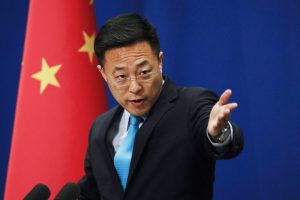In a move sure to add to tensions in Australia-China relations, on November 30 Chinese Foreign Ministry spokesperson Zhao Lijian tweeted a fake image depicting an Australian soldier holding a bloodied knife over the throat of an Afghan child.
Zhao added to the disturbing and offensive image – bearing the caption “Don’t be afraid, we are coming to bring you peace!” – the remark: “Shocked by murder of Afghan civilians & prisoners by Australian soldiers. We strongly condemn such acts, & call for holding them accountable.” He was referring to a new investigation by an independent commission on behalf of the inspector-general of the Australian defense force on the conduct of some special forces soldiers while they were deployed in Afghanistan, in 2006, 2012, and 2013. Zhao, by way of doubling down, has “pinned” the tweet to his Twitter timeline.
Predictably, the Australian government has taken strong exception to the tweet, with Prime Minister Scott Morrison calling it “truly offensive” and “repugnant,” according to a report by the Sydney Morning Herald on the story. The paper noted Morrison as saying, “It is an absolutely outrageous and disgusting slur. Australia is seeking an apology from the Ministry of Foreign Affairs and we are seeking it be removed from Twitter.”
At the time of writing, the tweet remains on Zhao’s timeline; neither has the Chinese Foreign Ministry proffered an apology, with Zhao’s fellow Foreign Ministry spokesperson Hua Chunying noting on the episode to the media at the daily press conference: “The Australian side is reacting so strongly to my colleague’s tweet – Does this mean they think the cruel killing of Afghan lives is justified? Afghan lives matter … shouldn’t the Australian soldiers feel ashamed?”
Since early summer this year, Australia-China relations have steadily worsened, with China effectively banning a range of Australian imports. On November 17, Beijing also issued a list of 14 grievances with Canberra through an unsigned note released to Australian media outlets. On its part, since 2018 Australia has pushed back against Chinese interference in Australian domestic politics and civil society; on November 5, the Australian government charged a community leader under new foreign interference laws passed in 2018, the first such instance. Australia became the first country in the world to ban Chinese 5G equipment and has also pushed for an inquiry into the origins of the COVID-19 pandemic.
An investigation led by New South Wales Supreme Court of Appeal Justice and army reservist Major General Paul Brereton has found soldiers predominantly from the Special Air Service Regiment’s 2nd Squadron committed 39 murders in 2006, 2012, and 2013 while it was deployed in Afghanistan as part of coalition forces tasked with fighting the Taliban and other extremist groups. The Brereton report has identified 25 current or serving soldiers as having committed these crimes. While the report remains classified, a redacted summery was released on November 19.
Releasing the public version of the report, the Australian Defense Forces chief General Angus Campbell, who was presented the classified report on November 6, offered an apology for the actions of Australian soldiers. News reports also suggest that Australia is looking to financially compensate family members of those killed, and the SAS 2nd Squadron effectively stands disbanded. In addition, 19 members of the Australian defense force face possible prosecution for murder, and 13 serving soldiers are likely to be dismissed from service.
Zhao, who was previously the deputy chief of mission in the Chinese embassy in Islamabad, has a long history of provocative assertions, earning him the dubious reputation of being the face of China’s recent “wolf warrior diplomacy.” Many foreign analysts took notice of the Chinese Foreign Ministry’s decision to make him one of two regular ministry spokespersons in February this year, despite Zhao’s social media pronouncements from his time in Pakistan. This, to many, indicated the possibility of a culture in China’s Foreign Ministry where brashness bordering on diplomatic misdemeanor is not only condoned but also rewarded.

































